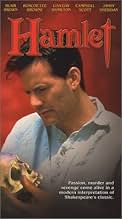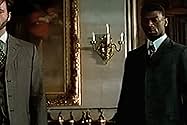Añade un argumento en tu idiomaThe classic Shakespeare tragedy is revisioned in America at the turn of the 20th Century. Campbell Scott (Singles, The Spanish Prisoner) adapted, co-directed and stars in the title role with... Leer todoThe classic Shakespeare tragedy is revisioned in America at the turn of the 20th Century. Campbell Scott (Singles, The Spanish Prisoner) adapted, co-directed and stars in the title role with Tony Award winner Blair Brown (Copenhagen) as his mother Gertrude.The classic Shakespeare tragedy is revisioned in America at the turn of the 20th Century. Campbell Scott (Singles, The Spanish Prisoner) adapted, co-directed and stars in the title role with Tony Award winner Blair Brown (Copenhagen) as his mother Gertrude.
- Dirección
- Guión
- Reparto principal
Reseñas destacadas
I have seen several different versions of "Hamlet" with various actors playing the title role, but Campbell Scott's portrayal is one of the best, revealing Hamlet's thoughts and emotions as if the viewer were inside his mind. Hamlet's decline into madness was justified (rather than simply "going insane" because the script ordered insanity) by the midnight vision of the ghost, and his flirtation with suicide was logical yet gripping. Perhaps the highest praise I can bestow is that, even though I was familiar with the play, I understood the inner motivations of the main characters in a fresh new way. Bravo!
I have watched many versions of Hamlet. Some good and some bad. But this is the first Hamlet where I practically understand all of Hamlet's soliloques! Campbell Scott's performance as Hamlet really won me over. He plays Hamlet as a sensitive young man trying to come to grips with his father's untimely death and his mother's hasty marriage to his uncle. When this Hamlet sees the ghost of his father, he pretty much goes mad. And I mean, not just playing mad, but going mad.
There is something in the way that Campbell Scott saids his lines that makes me totally understand what Hamlet is feeling. Often times, I don't understand everything that Hamlet saids, but this time, I understood practically everything!
The rest of the cast is very good, especially Blair Brown who plays the queen.
I've watched this movie two times because I was fascinated by Campbell Scott's great performance. This was one of the few movie rentals that I've enjoyed in a long time.
Anyone who likes Shakespeare's work will love this version.
There is something in the way that Campbell Scott saids his lines that makes me totally understand what Hamlet is feeling. Often times, I don't understand everything that Hamlet saids, but this time, I understood practically everything!
The rest of the cast is very good, especially Blair Brown who plays the queen.
I've watched this movie two times because I was fascinated by Campbell Scott's great performance. This was one of the few movie rentals that I've enjoyed in a long time.
Anyone who likes Shakespeare's work will love this version.
All interpretations are valid to some respect, I suppose, but some choices the director makes end up radically altering the flow of the play; and any choice that REQUIRES excising 'inconvenient' bits of the text must be considered an alteration of the playwright's intent, rather than an interpretation. A few comments:
1) Campbell Scott's portrayal was quite good; he played Hamlet quietly and intensely rather than explosively, which is fair enough. But the decision to underplay other characters came off less well. For instance, Claudius barely seemed upset at all during his "My offense is rank" soliloquy. THIS was a soul in torment? (But bland Claudii are a pet peeve of mine.) And Gertrude, in her closet, often seemed unperturbed that she'd just seen her son kill a man. And most of all, having Laertes give his "That drop of blood which is calm proclaims me bastard!" speech in a controlled, subdued manner is basically an oxymoron. On the other hand, keeping the emotional level low was effective in creating an atmosphere of tension and creepiness throughout, rather than one of high drama and spectacle.
2) Nonetheless, POLONIUS IS A COMIC CHARACTER!!! To play him straight, with unrelenting quiet dignity, changes the whole tone of the first half of the play. You're SUPPOSED to laugh through the first two acts, to set you up for the shift that comes in with "The Mousetrap" and culminates in Polonius's death. Polonius, like Mercutio in "Romeo and Juliet", is a representation of Comedy itself, and his death marks the point from which there's no escape from tragedy. I see nothing gained by stripping Polonius of his laughs, and much lost (including, if nothing else, our simple AFFECTION for the character).
3) Another pet peeve: I own 6 "Hamlets" on DVD, 4 of them substantially 'complete', and yet EVERY SINGLE ONE OF THEM cuts Hamlet's observation: "This is the imposthume of much wealth and peace, which inward breaks and gives no outward show why the man dies" (said upon seeing the forces of Norway headed for Poland). This line is VITAL, because it is Hamlet's value judgment on Fortinbras; this is the line that shows that Fortinbras is a yob. As Hamlet admires the Player's capacity for passion while recognizing the absurdity of his concern "for Hecuba", so does he admire Fortinbras' boldness while recognizing the absurdity of wasting 2,000 men and 20,000 ducats "for a straw." And if it's not made clear that Fortinbras is an absurdity, then the irony of Hamlet's turning-over of Denmark to him at the end of the play is lost... (end of rant)
On the whole, if you're familiar with 'Hamlet' already I would say that this might be an interesting addition to your viewing inventory, but I would NOT recommend it as your first encounter with the work.
1) Campbell Scott's portrayal was quite good; he played Hamlet quietly and intensely rather than explosively, which is fair enough. But the decision to underplay other characters came off less well. For instance, Claudius barely seemed upset at all during his "My offense is rank" soliloquy. THIS was a soul in torment? (But bland Claudii are a pet peeve of mine.) And Gertrude, in her closet, often seemed unperturbed that she'd just seen her son kill a man. And most of all, having Laertes give his "That drop of blood which is calm proclaims me bastard!" speech in a controlled, subdued manner is basically an oxymoron. On the other hand, keeping the emotional level low was effective in creating an atmosphere of tension and creepiness throughout, rather than one of high drama and spectacle.
2) Nonetheless, POLONIUS IS A COMIC CHARACTER!!! To play him straight, with unrelenting quiet dignity, changes the whole tone of the first half of the play. You're SUPPOSED to laugh through the first two acts, to set you up for the shift that comes in with "The Mousetrap" and culminates in Polonius's death. Polonius, like Mercutio in "Romeo and Juliet", is a representation of Comedy itself, and his death marks the point from which there's no escape from tragedy. I see nothing gained by stripping Polonius of his laughs, and much lost (including, if nothing else, our simple AFFECTION for the character).
3) Another pet peeve: I own 6 "Hamlets" on DVD, 4 of them substantially 'complete', and yet EVERY SINGLE ONE OF THEM cuts Hamlet's observation: "This is the imposthume of much wealth and peace, which inward breaks and gives no outward show why the man dies" (said upon seeing the forces of Norway headed for Poland). This line is VITAL, because it is Hamlet's value judgment on Fortinbras; this is the line that shows that Fortinbras is a yob. As Hamlet admires the Player's capacity for passion while recognizing the absurdity of his concern "for Hecuba", so does he admire Fortinbras' boldness while recognizing the absurdity of wasting 2,000 men and 20,000 ducats "for a straw." And if it's not made clear that Fortinbras is an absurdity, then the irony of Hamlet's turning-over of Denmark to him at the end of the play is lost... (end of rant)
On the whole, if you're familiar with 'Hamlet' already I would say that this might be an interesting addition to your viewing inventory, but I would NOT recommend it as your first encounter with the work.
This film has a lot of problems. It looks made for TV; it is overlong; the transposition to of the plot to 19th century America makes no sense. But the real weakness of the film is Cambell Scott.
The popularization of Freudian psychoanalysis has made it very easy to read Hamlet as neurotic; and very easy, too, to read his relationship with his mother as "Oedipal" fixation. Consequently, some readings of Hamlet have the whole play revolve around the question of whether Hamlet is mad, or just neurotic (and with good reason to be upset at his Step-dad).
All this should only remind us that Freudianism is a terrible trivialization of human personality.
If the reader really needs a one-sentence reduction of Hamlet it is this: Both Hamlet's father and his uncle-stepfather are barbarian bullies from Hell, and Hamlet is trying very hard not to be.
Notice that Mom of Denmark doesn't really show up in this equation. Nor does the avoidance of Hell seem to be an overly neurotic concern (certainly not for an Elizabethan).
Scott gives us a 20th century post-Freudian Hamlet. Of course the complex morality of the piece gets entirely lost.
Everybody here tries hard, but it's just not convincing.
The popularization of Freudian psychoanalysis has made it very easy to read Hamlet as neurotic; and very easy, too, to read his relationship with his mother as "Oedipal" fixation. Consequently, some readings of Hamlet have the whole play revolve around the question of whether Hamlet is mad, or just neurotic (and with good reason to be upset at his Step-dad).
All this should only remind us that Freudianism is a terrible trivialization of human personality.
If the reader really needs a one-sentence reduction of Hamlet it is this: Both Hamlet's father and his uncle-stepfather are barbarian bullies from Hell, and Hamlet is trying very hard not to be.
Notice that Mom of Denmark doesn't really show up in this equation. Nor does the avoidance of Hell seem to be an overly neurotic concern (certainly not for an Elizabethan).
Scott gives us a 20th century post-Freudian Hamlet. Of course the complex morality of the piece gets entirely lost.
Everybody here tries hard, but it's just not convincing.
I saw this film at first for the ordinary curiosity. Campell Scott is a good actor and his director work can create a conclusive message about an artistic vision and answer for the Hamlet definition. The final impression- a decorous movie and a subtle adaptation.
A delicate miniature with beautiful reflection. Or a spring butterfly. Accuracy, sensitivity, minuteness, theater experience, respect for play and nice flavor. Result of noble ambition and 29 days. But only a honest film and this fact is not a error of director or actors, fruit of clichés but element of special dross. Hamlet has many masks for a spectator. It is a Laurence Olivier's Hamlet,a Ion Caramitru's Hamlet, a Ethan Hawke's Hamlet, a Mel Gibson's Hamlet and many others Hamlets. They are parts of a huge image- in same time, illusion and reality- not of a acting manner or acting school/stile/conception but of the definition of reader/public.
Two elements of this Hamlet are relevant: Roscoe Lee Browne in beautiful Polonius skin and barefooted prince. It is enough for a TV version who must offers only a poor suggestion about a Hamlet vision, a personal question to the daily anxiety. And the form of a Sunday afternoon film is the best.
A delicate miniature with beautiful reflection. Or a spring butterfly. Accuracy, sensitivity, minuteness, theater experience, respect for play and nice flavor. Result of noble ambition and 29 days. But only a honest film and this fact is not a error of director or actors, fruit of clichés but element of special dross. Hamlet has many masks for a spectator. It is a Laurence Olivier's Hamlet,a Ion Caramitru's Hamlet, a Ethan Hawke's Hamlet, a Mel Gibson's Hamlet and many others Hamlets. They are parts of a huge image- in same time, illusion and reality- not of a acting manner or acting school/stile/conception but of the definition of reader/public.
Two elements of this Hamlet are relevant: Roscoe Lee Browne in beautiful Polonius skin and barefooted prince. It is enough for a TV version who must offers only a poor suggestion about a Hamlet vision, a personal question to the daily anxiety. And the form of a Sunday afternoon film is the best.
¿Sabías que...?
- ConexionesVersion of Le duel d'Hamlet (1900)
Selecciones populares
Inicia sesión para calificar y añadir a tu lista para recibir recomendaciones personalizadas
Detalles
Contribuir a esta página
Sugerir un cambio o añadir el contenido que falta

































